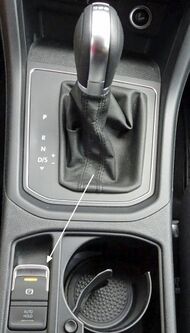Engineering:Electric park brake

Electric park brakes (EPB) are used on passenger vehicles to hold the vehicle stationary on grades and flat roads. This was accomplished traditionally using a manual parking brake. With electric park brakes, the driver activates the holding mechanism with a button and the brake pads are then electrically applied onto the rear brakes.[1] This is accomplished by an electronic control unit (ECU) and an actuator mechanism. There are two mechanisms that are currently in production: 1. Cable puller systems and 2. Caliper integrated systems.[2] EPB systems can be considered a subset of Brake-by-wire technology.
First installed in the 2001 BMW 7 Series (E65), electric park brakes have since appeared in a number of vehicles.
Functionality
Apart from performing the basic vehicle holding function required of park brakes, the EPB systems provide other functions like automatic release of the park brakes when the driver presses the accelerator, and re-clamping using additional force on detection of vehicle motion.[2] Further, the hill-hold function, which applies brakes to prevent roll-back when pulling away on a gradient, can also be implemented using the EPB.[3]
Implementation
The implementation of the control logic for the actuators is carried out by either using a stand alone ECU[4] or by integrating it in the ECU for electronic stability control[5]
Standards
The design of the electric park brakes should be compliant with:
References
- ↑ Hackenberg, Ulrich (November 2012). "Brakes The Art of Slowing Down". http://www.volkswagenag.com/content/vwcorp/info_center/en/publications/2012/11/VIAVISION_No_09_November_2012.bin.html/binarystorageitem/file/VIAVISION_GB.pdf.
- ↑ 2.0 2.1 Cheon, J.S; Jeon, J.W.; Jung, H.M.; Park, I.U.; Park, C.H.; Yeo, T.-J. (13 October 2009). "Main Design Factors and Unified Software Structure for Cable Puller and Caliper Integrated Type Electric Parking Brakes". http://www.sae.org/events/bce/presentations/2009/jscheon.pdf.
- ↑ "Electronic Parking Brake". http://www.volkswagen.co.uk/technology/parking-and-manoeuvring/electronic-parking-brake.
- ↑ "Electric Park Brake". http://www.trw.com/braking_systems/electric_park_brake.
- ↑ "VDA". http://vda.de/.
- ↑ "§ 571.105 Standard No. 105; Hydraulic and electric brake systems.". 1 October 2011. https://www.govinfo.gov/content/pkg/CFR-2011-title49-vol6/pdf/CFR-2011-title49-vol6-sec571-105.pdf.
- ↑ "§ 571.135 Standard No. 135; Light vehicle brake systems.". 1 October 2011. https://www.govinfo.gov/content/pkg/CFR-2011-title49-vol6/pdf/CFR-2011-title49-vol6-sec571-135.pdf.
- ↑ "Uniform provisions concerning the approval of passenger cars with regard to braking". 4 October 2011. http://www.unece.org/fileadmin/DAM/trans/main/wp29/wp29regs/R13hr2e.pdf.

